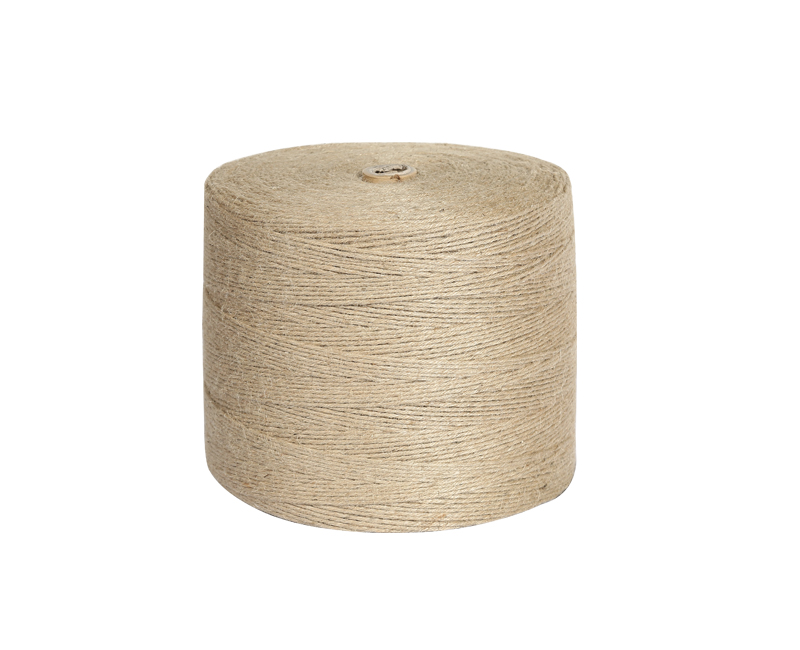

Jute thread (jute twigs) is a green, 100% natural and p […]
Jute thread (jute twigs) is a green, 100% natural and pollution-free alternative packaging material. Jute thread and jute twine spun out of natural jute fibres utilised for knitting, weaving of different kinds of jute cloths, are considered to be of superior quality. In fact, jute thread is so special that it is often compared to silk, only finer and of a better colour. Fine, soft jute yarns are essential for the manufacture of many diversified jute products.
Jute yarn is available in several different types, colours and quality. Jute threads are usually supplied as a wrap, flat, uneven length threads, even length threads etc. Jute yarn can also be coarser (as per texture) or finer. The finer and coarser varieties are more durable and offer better colour vibrancy, strength, wear resistance and colour preservation. Jute yarn can be suitable for a variety of packaging applications.
Jute threads can be: (I) Flat weave, (ii) Wrap weave, (iii) Long fibre, (iv) Light and heavy fiber, (v) Ply and needle weave. Jute thread can be found in several packing applications. Jute thread can be utilized in: (a) Jute Bottles, (b) Jute Tote Bags, (c) Jute Covers, (d) Jute Dishcloths, (e) Jute Sheets and (f) Jute Boxes.
Jute can be used to produce a range of packaging materials. Jute is often combined with cotton, polypropylene, polyester, sateen and other synthetic fibers to create a range of superior quality and durable packaging options. Jute fine yarn is frequently combined with bromine, tin plate and aluminum oxide to improve the durability of Jute Packaging. Apart from superior quality packaging, Jute has a number of features which make it an ideal packaging option: Jute is available in a wide range of weights and diameter, it is highly resistant to mildew and chlorine, Jute is suitable for use in a wide range of temperature and it resists tearing and abrasion.
Baisheng Jute yarn can be: (I) Inherently strong, (it is not like cotton but is stronger than cotton because it is more resilient and is woven).

Jute is the yarn used to make woven synthetic sacks for packing any type of merchandise. Jute is used in the manufacturing of sails, ropes, bags, garments, bedding items, footwear, kitchen curtains, table cloths, table-cloth and a variety of other home items. The high value and durability of Jute make it one of the most popular yarns in the world. Jute is considered an eco-friendly product as its processing does not involve the use of pesticides or chemical fertilizers. Jute is non-woven, so it does not harm the environment.
Jute comes in two different forms: (I) Jute twine and (ii) Jute plants. Jute plant is the product of Jute plant and Jute twine is the completed product of Jute twines. Jute twine is generally preferred over Jute plant as it is stronger and more durable. These products are further segregated according to the fiber that they are made of, and the threads that these are knotted in are termed as Jute strands or Jute threads. Jute threads are available in a wide range of colors; some of them are dyed and some are not.
Jute fiber is extremely strong and is known to be capable of withstanding tension of up to 400%. The texture of Jute fabric is soft and it looks very much like cotton. Jute is a soft, natural and eco-friendly material. It can be used to create beautiful textiles, bedding, curtains, tablecloths and many more home accessories. Jute fiber is available in a high-quality Jute thread which is spun on a special machine.
Jute yarn has great resistance towards chemicals and its threads are also capable of holding their color for a longer period of time than any other artificial fiber. It has a superior thermal strength and its threads are capable of enduring extreme temperature changes. Jute fiber has a long lifespan and it can be used even after many years. It is durable, tensile, chemical resistant and has high moisture resistance.
Baisheng Jute yarns are available in both sheened and non-sheened varieties. In case of sheen yarn, the knots in the fabric stay intact and are thus more durable and better able to resist the bleaching effects of chemical bleaches. However, the sheen version Jute yarn has no such properties and it is therefore quite popular for its non-bleached, shiny appearance. Jute fiber is spun through a method called "ravishing".
Jute yarns are available in a large variety of natural colors and can be dyed with any color of your choice. They are very durable and are ideal for rugs, carpets, napkins and curtains. In order to prevent the unraveling of the yarn, Jute yarns should be pre-twined at the beginning of weaving. A strong knot construction ensures the superior quality of Jute yarns.